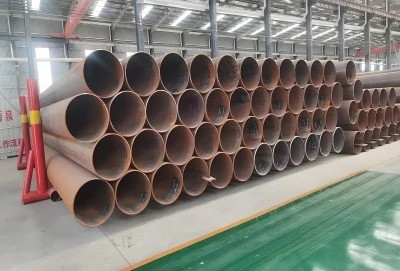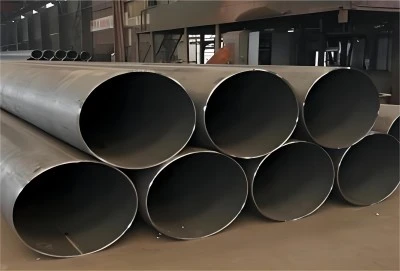API 5L X60 steel pipe is a crucial component in various industries, particularly in oil and gas transportation. To ensure the highest standards of quality and safety, these pipes undergo rigorous testing procedures. In this comprehensive guide, we'll explore the testing requirements for API 5L X60 steel pipe, the role of third-party inspections, mechanical testing standards, and specific non-destructive testing (NDT) requirements.
|
|
|
How do third-party inspections ensure quality?
Third-party inspections play a vital role in maintaining the quality and integrity of API 5L X60 steel pipes. These independent assessments provide an unbiased evaluation of the manufacturing process and the final product, ensuring compliance with industry standards and specifications.
One of the primary functions of third-party inspections is to verify that the steel pipe meets the chemical composition requirements set forth by the API 5L specification. This involves analyzing the steel's chemical makeup to ensure it falls within the prescribed ranges for elements such as carbon, manganese, phosphorus, and sulfur. By confirming the correct chemical composition, inspectors can help guarantee the pipe's strength, durability, and resistance to corrosion.
Additionally, third-party inspectors oversee various stages of the manufacturing process, including:
- Raw material inspection
- Heat treatment processes
- Dimensional checks
- Surface finish evaluation
- Welding quality assessment (for welded pipes)
These comprehensive inspections help identify any potential defects or deviations from the required specifications early in the production process. By catching and addressing issues promptly, manufacturers can ensure that only high-quality API 5L X60 steel pipes reach the end-users.
Furthermore, third-party inspections often include witnessing of mechanical and non-destructive tests. This oversight adds an extra layer of credibility to the test results and helps prevent any potential manipulation or misrepresentation of data. The presence of independent inspectors during these critical tests instills confidence in the reliability and performance of the steel pipes.
What are the mechanical testing standards for API 5L X60 Steel Pipe?
Mechanical testing is a crucial aspect of quality assurance for API 5L X60 steel pipes. These tests evaluate the pipe's ability to withstand various stresses and strains it may encounter during its service life. The API 5L specification outlines several key mechanical tests that must be performed on X60 grade steel pipes:
1. Tensile Strength Test: This test measures the pipe's ability to resist breaking under tension. For API 5L X60 steel pipes, the minimum required tensile strength is 520 MPa (75,400 psi). The test involves applying an increasing load to a sample of the pipe material until it fractures, providing data on both the ultimate tensile strength and the yield strength.
2. Yield Strength Test: The yield strength test determines the stress at which the pipe material begins to deform plastically. For X60 grade pipes, the minimum required yield strength is 415 MPa (60,200 psi). This test is crucial for ensuring that the pipe can withstand the pressures it will be subjected to during operation without permanent deformation.
3. Elongation Test: This test measures the ductility of the steel pipe by determining how much it can stretch before breaking. The API 5L specification requires a minimum elongation percentage, typically measured over a 50mm (2-inch) gauge length. For X60-grade pipes, the minimum elongation percentage is usually around 18-22%, depending on the pipe's diameter and wall thickness.
4. Flattening Test: This test is specifically for welded pipes and assesses the quality of the weld seam. A section of the pipe is flattened until the distance between the plates reaches a specified value. The test checks for any cracks or openings in the weld area, ensuring the integrity of the welded joint.
5. Charpy V-notch Impact Test: This test evaluates the toughness of the steel pipe material by measuring its ability to absorb energy during high-speed fracture. It's particularly important for pipes that will be used in low-temperature environments. The test involves striking a notched specimen with a pendulum and measuring the energy absorbed during the impact.
These mechanical tests provide crucial data on the strength, ductility, and overall performance characteristics of API 5L X60 steel pipes. By meeting or exceeding these standards, manufacturers can ensure that their pipes will perform reliably under various operational conditions, contributing to the safety and efficiency of pipeline systems.
Are there specific NDT requirements for API 5L X60 pipes?
Non-destructive testing (NDT) is an essential component of the quality assurance process for API 5L X60 steel pipes. These tests allow for thorough inspection of the pipes without causing damage, ensuring their integrity and reliability. The API 5L specification outlines several NDT methods that are commonly employed for X60 grade pipes:
1. Ultrasonic Testing (UT): This method uses high-frequency sound waves to detect internal flaws, such as laminations, inclusions, or cracks. For API 5L X60 pipes, ultrasonic testing is typically performed along the entire length of the pipe. The test can identify defects as small as 3% of the wall thickness, making it highly effective for ensuring the pipe's structural integrity.
2. Magnetic Particle Inspection (MPI): MPI is used to detect surface and near-surface defects in ferromagnetic materials like steel. For API 5L X60 pipes, this method is particularly useful for inspecting the pipe ends and any areas where surface defects are suspected. The test involves magnetizing the pipe surface and applying magnetic particles, which congregate around any discontinuities, making them visible to inspectors.
3. Radiographic Testing (RT): This method uses X-rays or gamma rays to create images of the pipe's internal structure. For API 5L X60 pipes, radiographic testing is often used to inspect weld seams in welded pipes. It can detect internal defects such as porosity, lack of fusion, or inclusions within the weld. The API 5L specification requires radiographic testing of the entire weld seam for certain pipe sizes and grades.
4. Eddy Current Testing: This electromagnetic testing method is particularly useful for detecting surface and near-surface defects in API 5L X60 pipes. It's often used as a complement to other NDT methods, providing rapid inspection capabilities for detecting flaws such as cracks, seams, or variations in wall thickness.
5. Hydrostatic Testing: While not strictly an NDT method, hydrostatic testing is a crucial requirement for API 5L X60 pipes. This test involves filling the pipe with water and pressurizing it to a level above its designed operating pressure. The test checks for leaks and verifies the pipe's ability to withstand pressure without failure. For X60 grade pipes, the test pressure is typically set at 90% of the specified minimum yield strength.
These NDT methods, when used in combination, provide a comprehensive evaluation of API 5L X60 steel pipes. They help ensure that the pipes are free from defects that could compromise their performance or safety during operation. The specific NDT requirements may vary depending on the pipe's intended use, customer specifications, and any additional standards that may apply to the project.
It's worth noting that the frequency and extent of NDT can vary based on the production process and the level of product specification level (PSL) as defined in the API 5L standard. For instance, pipes manufactured to PSL 2 requirements typically undergo more rigorous and frequent NDT compared to those made to PSL 1 specifications.
China API 5L x60 Steel Pipe Suppliers
The testing requirements for API 5L X60 steel pipes are comprehensive and stringent, ensuring the highest standards of quality and safety in the oil and gas industry. From third-party inspections to mechanical testing and non-destructive evaluation, each step in the quality assurance process plays a crucial role in delivering reliable and durable steel pipes.
LONGMA GROUP products cover levels including PSL1 and PSL2. Our Fastest Delivery Time is 7 Days for normal specification. Our products undergo various tests: Chemical Component Analysis, Mechanical Properties (Tensile strength, Yield strength, Elongation), Ultrasonic Testing, NDT (nondestructive testing), Hydrostatic Test, X-ray Test. If you are choosing your China api 5l x60 steel pipe suppliers, welcome to contact LONGMA GROUP at info@longma-group.com.














